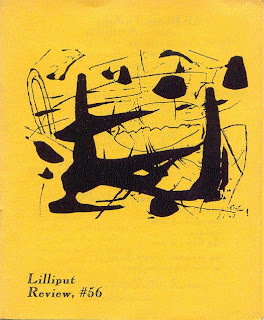Cover by Harland Ristau
I've begun simultaneously working on the forthcoming Basho Haiku Challenge Chapbook and the new issues of Lilliput Review. As with all the other things I try to do in tandem, they've become mixed together and so as a result work on both has slowed considerably (and, of course, there are also the small matters of this daily blog and all those snail mail poems - about 1,000 batches per year - to deal with). I originally hoped to get the new issues out by February first and had projected a January publication for the BHC Chapbook, but realistically I'm looking at a March 1st date for both. One and a half issues and the entire chapbook are in the preliminary layout stages - poems done, no artwork or covers - so slow and steady progress dictates the March 1st date. If I can get the chaps out sooner I will, but the issues won't begin to go out until the 1st.Of note this morning, The Writer's Almanac has posted a fine poem by Elizabeth Alexander, who will be presenting a new poem today at the inaugural.
Ars Poetica #100: I Believe
Poetry, I tell my students
is idiosyncratic. Poetry
is where we are ourselves.
(though Sterling Brown said
"Every 'I' is a dramatic 'I'")
digging in the clam flats
for the shell that snaps,
emptying the proverbial pocketbook.
Poetry is what you find
in the dirt in the corner,
overheard on the bus, God
in the details, the only way
to get from here to there.
Poetry (and now my voice is rising)
is not all love, love, love
and I'm sorry the dog died.
Poetry (here I hear myself loudest)
is the human voice
and are we not of interest to each other?Elizabeth Alexander
Tuesday being the new Lilliput archive day and this being Tuesday, it's that time. This week's highlights come from issue #56, April 2004.
Stars Fading Over A Red Trace
light pierces
lacework of trees
igniting
the flame of day
his presence, always closest
in this defenseless hour
Vogn
Theatre Piece
You have only to put a pinhole
in the backdrop to create a star.
Of course, you won't see it
that way, but someone out front,
someone in the seventh row
on the aisle or high in the balcony
where the music and lines
seldom reach, will see it
for what it is, a star,
something to dream on.Louis McKee
Word
Iris spins
wide to light,
pushes against
the pull to
cautious pinhole focus,
seeks out the word
blurring to flesh inside
the snow blind cave
in the skull.
Mary Schooler Rooney
The Way It Is
You languish in Gaia's apron pocket
chewing on the strings.
Winds are blowing through your oven
flattening your bread.
You herd with sheep in city streets,
followed by barking dogs.
Language is your Nemesis
Indian gift of the Gods.Jane McCray
Poetry Begins
with the road gang on Route 6
repairing the pole smashed
on a Saturday night drag race
and a stray dog pissing
on the perimeters.
Ruth Daigon
Harley Time
Writing a poem
is like driving a motorcycle,
baby pigs in the side car,
while you try to keep
their little helmets on straight.George Monagan
Finally, Ed Markowski sent this along in homage to this historic day. Enjoy.
best,
Don










.jpg)












